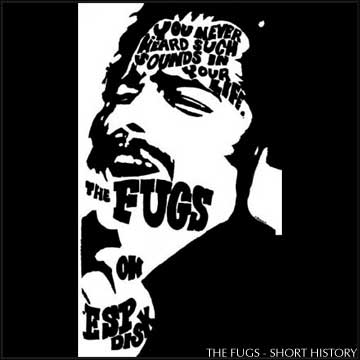NEW YORK TIMES: The Fugs were, in the view of the longtime Village Voice critic Robert Christgau, “the Lower East Side’s first true underground band.” They were also perhaps the most puerile and yet the most literary rock group of the 1960s, with songs suitable for the locker room as well as the graduate seminar (“Ah, Sunflower, Weary of Time,” based on a poem by William Blake); all were played with a ramshackle glee that anticipated punk rock. With songs like “Kill for Peace,” the Fugs also established themselves as aggressively antiwar, with a touch of absurdist theater. The band became “the  U.S.O. of the left,” Mr. Kupferberg once said, and it played innumerable peace rallies, including the “exorcism” of the Pentagon in 1967 that Norman Mailer chronicled in his book “The Armies of the Night.” (The band took its name from a usage in Mailer’s “Naked and the Dead.”) The Fugs was formed in 1964 in Mr. Sanders’s Peace Eye Bookstore, a former kosher meat store on East 10th Street in Manhattan. By then Mr. Kupferberg, already in his 40s, was something of a Beatnik celebrity. He was an anthologized poet and had published underground literary magazines with titles like Birth and Yeah. He had also found notoriety as the inspiration for a character in Allen Ginsberg’s poem “Howl.” As Ginsberg and Mr. Kupferberg acknowledged, he was the one who “jumped off the Brooklyn Bridge this actually happened and walked away unknown and forgotten,” a reference to a 1945 suicide attempt (off the Manhattan Bridge, not Brooklyn) that had been precipitated by what he called a nervous breakdown. The fame that episode earned him caused Mr. Kupferberg a lifetime of chagrin and embarrassment. “Throughout the years,” he later said, “I have been annoyed many times by, ‘Oh, did you really jump off the Brooklyn Bridge?,’ as if it was a great accomplishment.” MORE
U.S.O. of the left,” Mr. Kupferberg once said, and it played innumerable peace rallies, including the “exorcism” of the Pentagon in 1967 that Norman Mailer chronicled in his book “The Armies of the Night.” (The band took its name from a usage in Mailer’s “Naked and the Dead.”) The Fugs was formed in 1964 in Mr. Sanders’s Peace Eye Bookstore, a former kosher meat store on East 10th Street in Manhattan. By then Mr. Kupferberg, already in his 40s, was something of a Beatnik celebrity. He was an anthologized poet and had published underground literary magazines with titles like Birth and Yeah. He had also found notoriety as the inspiration for a character in Allen Ginsberg’s poem “Howl.” As Ginsberg and Mr. Kupferberg acknowledged, he was the one who “jumped off the Brooklyn Bridge this actually happened and walked away unknown and forgotten,” a reference to a 1945 suicide attempt (off the Manhattan Bridge, not Brooklyn) that had been precipitated by what he called a nervous breakdown. The fame that episode earned him caused Mr. Kupferberg a lifetime of chagrin and embarrassment. “Throughout the years,” he later said, “I have been annoyed many times by, ‘Oh, did you really jump off the Brooklyn Bridge?,’ as if it was a great accomplishment.” MORE
Curated News, Culture And Commentary. Plus, the Usual Sex, Drugs and Rock n' Roll
